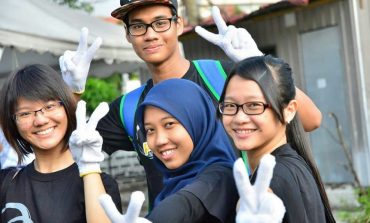It is always a tricky subject, trying to understand what the youth of any country want. In Malaysia, this could be crucial as the record number of first-time voters could have a huge impact on the outcome of GE 13.
With new voters now making up one in five of the country’s 13.1 million voters or about 22 per cent (2.9 million) of the electorate, both Barisan Nasional and Pakatan Rakyat are expected to focus on them.
Key issues for such voters will be education and jobs, and on both these counts BN has a strong edge over the Opposition.
After all, Prime Minister Datuk Seri Najib Razak has focused on reforming the education system and creating job opportunities.
With the National Education Blueprint 2013-2025, Najib has effectively set out a roadmap for Malaysia to achieve educational success for the next generation, in the same way his successful economic roadmap will see the country reach high-income status by 2020.
The Prime Minister is also far more tuned to the 20-something generation than his counterpart in the Opposition, Datuk Seri Anwar Ibrahim, who has only had one live internet session on the social networking service Google Plus.
Najib, on the other hand, has had several interactions with the digital rakyat, the latest being a live discussion on YouTube last month.
Even on social networking sites like Facebook, Najib (1,225,537 likes) is far more popular than Anwar (401,116 likes).
Najib is also more comfortable connecting with the youth in person. His latest interaction was at a coffeehouse in Bangsar in KL, where he brainstormed with them on Wednesday, churning out ideas on several day-to-day concerns affecting Malaysians.
“The important thing is, we want to build this nation, and as your prime minister, I want to listen to your ideas and I believe that some of your ideas are great ideas,” he said.
Some 48 participants, including youth leaders, senior media representatives, and bloggers, participated in the session to share ideas with Najib.
They discussed topics such as ways to improve customer service, the education system, tourism revenues, street cleanliness, as well as decreasing instances of diabetes in the country.
This was not just talk – the Prime Minister was serious when he said he was there to listen.
“Because I have lots of hope for the nation, and those hopes can be translated, and can become reality,” Najib said, adding that young people could generate ideas that could help the government in its programme to transform the country.
He called on the youth, regardless of their political beliefs, to work with the government to build a fully-developed nation.
“This is our country and we must make Malaysia second to none, and I believe we can do it,” Najib said.
The Prime Minister then took this one step further, launching ‘Genovasi Challenge’, which will serve as a platform for young Malaysians to take ownership of the positive changes they wish to see in the country. This is part of the Genovasi initiative that Najib launched in August.
Across the country, one of the key messages that the Government is trying to foster is just how vital a role young people have to play in Malaysia’s growth.
This is a logical approach for a nation’s future: invest in, encourage, and nurture today’s youth, and tomorrow our talent pool will be of the calibre our country needs to move forward.
Najib recognises this, as evidenced by his commitment to engaging directly with young people – either over his social media accounts like Twitter and Facebook, or during his public walkabouts.
By reaching out and asking directly what it is that they want, he is better equipped to help in providing those measures.
And young people across the country are reacting well to his policies. Najib enjoys 61 per cent support among 21-30 year olds, according to a recent survey by Merdeka Center.
Another recent study also found that 52 per cent of the youth will vote BN. The academic paper prepared by International Islamic University of Malaysia (IIUM) Electoral Studies head Datuk Prof Syed Arabi Idid, surveyed 1,370 people in the 21-35 age group.
When respondents were asked which party they would vote for if “elections were to be held tomorrow”, 52 per cent said BN is their choice.
This is bad news for Pakatan Rakyat, a coalition that claims to represent the new generation but is still led by Anwar, a 64-year old career politician who last occupied office in the 1990s.
Najib, on the other hand, is 59 years old and much more clued in with the younger generation. His direct approach is also better suited to involve the youth in the country’s development.

